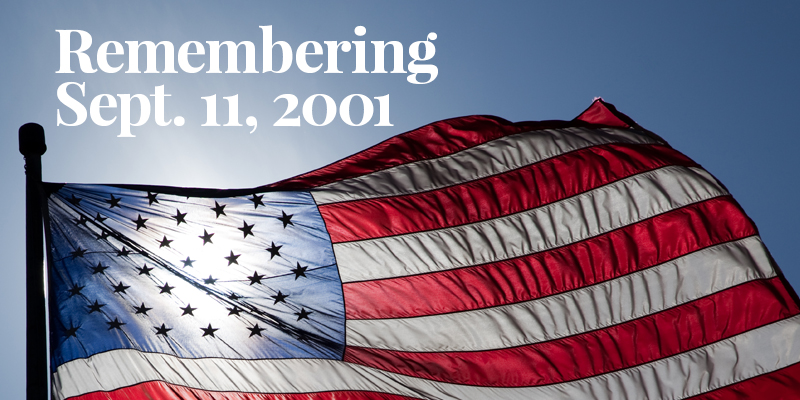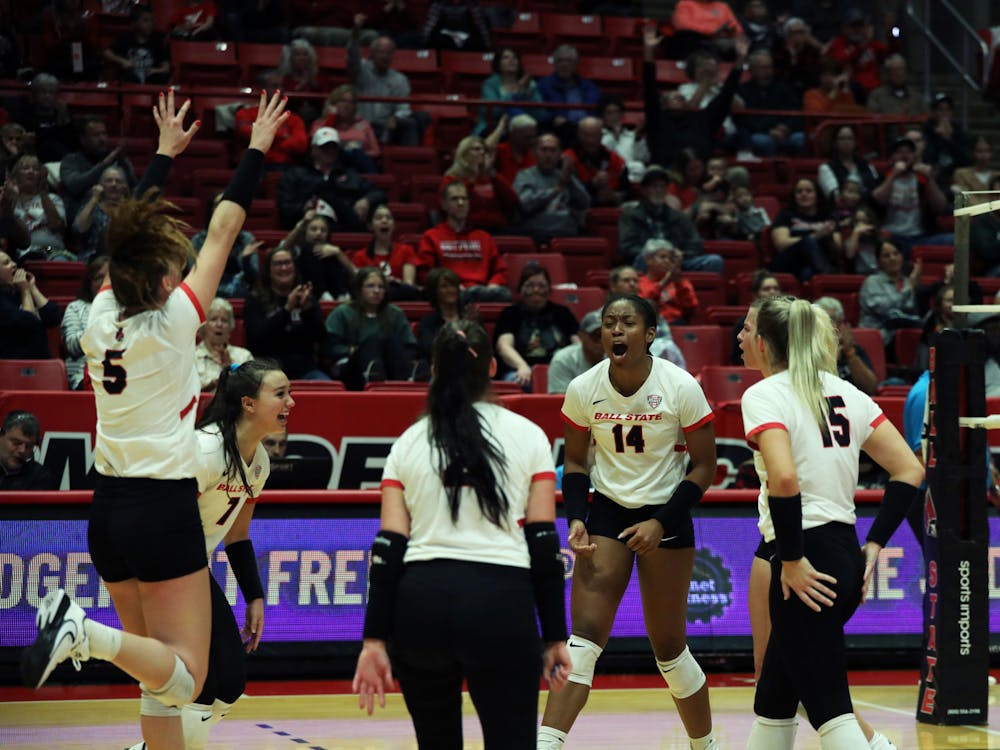
Creative commons image
On Sept. 11, 2001, America suffered from a terrorist attack that would shake the country to its core. As the 15th anniversary of 9/11 approaches, students and faculty remember the impact the terrorist attack had on their lives.
Images provided by Daniel Jacobsen
"For everyone else, this was a moment in history. For the people who were involved, it was the worst day of their life. It is absolutely the worst day of my life."

Alicia Baker Fitzgerald, the assistant director for student center programs, still clearly remembers the events of Sept. 11, 2001.
"For everyone else, this was a moment in history. For the people who were involved, it was the worst day of their life. It is absolutely the worst day of my life," she said.
Fitzgerald's family was living in northern Virginia while her father, a member of the US Air Force, was doing his second tour at The Pentagon. She was a freshman in high school.
She was in history class when the announcement came over the school's loudspeaker. The class was watching a film, but switched the television to live coverage and were watching as the news broke about the attack on the Pentagon.
"I had such a hard time comprehending what we were hearing that, after several minutes, I remember I walked up to my teacher and I asked if anybody was hurt," Fitzgerald said. "It was just so foreign to me. I couldn't wrap my mind around the fact that something really could have happened."
Because of the high volume of people trying to contact their friends and family, the systems were jammed, making Fitzgerald's cell phone unusable.
Her mom, who worked at Macy's, heard the news from a coworker and left work to sit by the family's landline phone and wait for news.
"I think she probably had the hardest time, because she was fielding the calls from our entire family … and nobody had any news for her," Fitzgerald said.
For Fitzgerald, the hours after the attack are a long blur of waiting for news.
"I don't remember being in class the rest of the day," she said. "I know that I went to class, I know I walked the hallways some and just waited."
The wait was long and difficult, Fitzgerald said. As many of her friends who had parents at the Pentagon heard news, it was a struggle to not know about her father.
"It's not one of those cases where you think that no news is good news," she said. "As each person hears, you're grateful that they know and that their waiting is over, but you wonder if that means you don't know because nobody wants to tell you."
She wasn't informed that her father was OK until around 5 p.m., nearly six hours after the Pentagon was hit, according to CNN's timeline.
Someone from her father's division walked to the Pentagon City Mall and had the Macy's store there call the Macy's her mom worked at, which reached her on the family's landline phone.
"[They] passed along that somebody had seen my dad. He was alive, but that was really the most information we had at that point," Fitzgerald recalled.
Fitzgerald didn't get home until 5 p.m., and her father arrived shortly after. The memory of seeing her dad for the first time after the attack is still an emotional one.
"When he got home, he smelled like jet fuel. … That was the first time it really hit me. He came in and he smelled overwhelmingly like smoke and jet fuel," she said. "That was terrifying and really put it into perspective."
It was then that Fitzgerald realized she had been expecting the worst.
"I don't think I realized until I saw him how much I was convinced he was dead," she said.
Out of the five sections in the Pentagon, the section her father was in was adjacent to the one that was hit. He and co-workers had been in his office watching the news.
"They were all pilots and they had enough time to look at each other and say, ‘It's too fast and it's too low.' They knew it was coming," she said.
Fitzgerald said everyone in her dad's office was safe, but someone did lose a spouse who was working in another section of the Pentagon.
"I think one of the hardest parts was that the next day, he got up and went to work, and I remember having a conversation with him that this was his duty. This is what he always had committed to," she said.
Though the anniversary of 9/11 is still a challenging day for Fitzgerald, she sees Patriot's Day as a unifying experience for Americans.
"It really does affect everyone, and just because you didn't lose somebody personally or you didn't sit by the phone, that doesn't mean that you weren't very profoundly affected by 9/11," she said. "I think everyone in the country was."
"Every time I look at the new World Trade Center, I can almost imagine a plane flying into it."

Daniel Jacobsen, a senior photojournalism major, was only six when the World Trade Centers came down.
When his mom picked him up after school on Sept. 11, 2001, and told him what happened, he noticed the gray dust on her shirt – the remains of the fallen buildings.
His first response was fear.
“Are they going to fall on us?” he asked.
Jacobsen was living about 50 minutes away from the World Trade Center, close enough to know those buildings were important, even at age six.
Jacobsen's family had planned on going to a Yankee baseball game that night. Instead they spent the evening putting out candles on the sidewalk to honor the victims.
His father was the chief of police in Malverne, New York, a nearby village. In the days that followed, first responders spent countless hours at the site, Jacobsen's father included.
For a week he took a team out there for long 12-hour shifts, would come home and sleep and then return to work. Before he was able to come into the house, he had to remove his clothes that were caked in dust in the garage.
“He smelled like the World Trade Center ...” Jacobsen said.
His dad later was awarded a rectangle of steel, recognizing his service.
There were horrifying things Jacobsen's dad didn't tell him until much later, like when he saw the uniform of a fireman let behind — but the body had been crushed. And there are also things he just doesn't remember.
“I didn't have a great grasp of the situation,” he recalled. “Over the years I eventually learned more and more about it. He would go down to the anniversaries, and he brought back a couple of pieces of burnt rubble.”
His mom was even closer to the action than Jacobsen was. As the first plane hit, she was on the subway heading to work. When she arrived at Pennsylvania Station, she was greeted with chaos.
On her subway ride home later on, people who had been near the towers when they fell were on the train, covered in ashes. That's how some of the dust from that morning ended up on his mom.
Although the event impacted the whole country, Jacobsen feels an even larger connection with the tragedy.
“I don't know if this was because [my dad] was a part of it or if it's because I'm from New York, but I have strong feelings about 9/11,” Jacobsen said. “Every time I look at the new World Trade Center, I can almost imagine a plane flying into it, because I've seen all the video. So it's had an impact on me. I hope people don't forget about it.”
"You heard it, and you felt it in your chest."

Steven Schuler, director of instructional technology at Ball State, learned a plane hit the World Trade Center through a phone call.
“Hey you need to turn on the TV,” Schuler's wife said to him on the phone.
At the time, he and his wife lived two miles from the Pentagon, and his wife worked at the Smithsonian Castle on the National Mall.
Another plane was heading towards Washington, D.C., and she would have to evacuate the building.
After hanging up, Schuler went outside his home. That's when a plane hit the Pentagon.
“I heard planes land 100 times a day, and they sound exactly the same,” Schuler said.
This time was different.
“You heard this thing, and it just sped up, and it went really low over our house. Within seconds you heard this [explosion]," he said. "You heard it, and you felt it in your chest.”
The first thing he thought about was his wife. His phone calls weren't going through to her so he had no clue if she was even safe.
Then the phone calls started coming in from his boss. At the time, he was working on a contract as a programmer for the Department of Defense. His company was hired to create a joint operation control center about a mile and a half away from the Pentagon, in case of a terrorist attack.
They were supposed to be finished with the center on Oct. 1. But as the nation began to respond to the crisis, the D.O.D. would need the space.
At first, Schuler didn't even want to answer the phone. He was still worried about his wife. When he finally did, his boss told him Schuler was the only one close enough to get to the center. He would need to make sure everything was operational.
As he headed to work he passed the Pentagon, billowing up in smoke and surrounded by emergency vehicles. It felt like a movie, he said.
“I saw that and knew lots of people had just died,” Schuler said, taking a pause. “To see that, it makes you feel tiny. It makes you feel sort of insignificant ...”
The other side of the interstate was packed with cars heading away from the city. The northbound side was nearly empty. During his drive over, he got the call from his wife, saying she was OK, and a weight was lifted off his shoulders.
When Schuler arrived at the center, he found himself surrounded by military personnel as the only civilian in the room. One man pointed a gun at him, asking him questions before he could even enter the building.
“That's when I knew things had changed,” he said. “You pretty much heard the world cock its gun.”
Schuler started working to get the system operational. He hadn't brought any tools, so all he had to rely on were his teeth and a cheap Swiss Army knife he found.
He still has that knife 15 years later. He plans to give it to his son, who was born in 2004. His son will read about the tragedy in history books and hear about it from his parents.
“Will the [pocket knife] mean anything to him, or is it just some stupid thing?” Schuler said.
Schuler still remembers 9/11 clearly, and to him it doesn't seem like 15 years ago. But for the youngest Ball State students, they might have been too young to really remember — three, four, five years old at the time of the attacks.
They won't remember life before all of the fear, the sudden patriotism or the quickness in which some rushed to place blame, Schuler said.
“We have to remind you guys what life was like September 10, 2001,” Schuler said. “It was a lot different the day before.”





